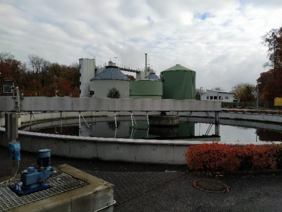On 12 and 13 May, the hybrid project meeting of the CoAct project took place at the IfLS. The project meeting focused on the biomass mix for the operation of a facility at the Kressbronn wastewater treatment plant, site planning as well as economic assumptions. The aim of the project is the production of activated carbon from residual biomass through pyrolysis.
The biomass mix affects various aspects. On the one hand, the proportion of herbaceous biomass determines how much pressed juice is produced in the so-called IFBB procedure, which separates the solid and liquid parts of the biomass and prepares the former for pyrolysis. Synergies with the operation of the wastewater treatment plant can be generated if the pressed juice can be used as a carbon addition in the treatment process. For this, the proportion of herbaceous biomass must be high enough to cover current and future demand. Furthermore, surplus press juice can be utilised energetically in the digestion tower. Based on the biomass mix envisaged by the project, a logistics and storage concept is now being developed. These are relevant for the site planning, as suitable areas have to be provided. In addition, an exchange took place about the processes and existing infrastructure in order to further optimise the previous concepts. Planning requirements and issues are taken into account at an early stage. The consortium also agreed on various scenarios for price development in order to be able to present an economic framework for the construction and operation of the CoAct plant that is as realistic as possible.
In the next step, the assumptions discussed will be applied in the models and plans in order to evaluate the operation of a CoAct plant economically and ecologically. Parallel to this, work is being done on the realisation of large-scale trials with activated carbon at the Kressbronn wastewater treatment plant.
Further information on the project can be found here [in german]. Information on the German BMBF funding activity "Stadt-Land-Plus" is also available.
Contact persons at IfLS: Dr. Ulrich Gehrlein (gehrlein[at]ifls.de) and Christoph Mathias (mathias[at]ifls.de)
